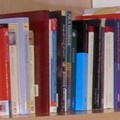Free E-Book or Expensive Critical Edition - Why You
Should Even Bother

It is tempting to download a file of a
classical novel, say, Mary Shelley's Frankenstein,
to your e-reader, phone, or tablet for free when
a critical edition by a good publisher is almost
twenty euros. An e-text is searchable, easy to
access. When you want to work with the text
intensely, however, an annotated edition with an
authoritative text may be well worth the investment.
This article will tell you how to get the best of
both worlds.
There are advantages to e-books, of course.
The text is immediately available, without your leaving
the house, often at low or no cost. If you are looking
for a particular passage, it can be located within a
second of hitting the SEARCH button. Also, e-readers
weigh less than most books, although you can carry your
whole library around with you. Even a broken wrist will
not stop you using an e-reader, as it can be operated
with one hand. Reading comprehension is not normally
dependent on the medium, however, recent research
suggests that there might be a cognitive difference
between reading a text on a screen and reading the same
text in a book.[1]
What is a critical edition (and why
bother with it)?
A critical edition is "any edition that
attempts to construct a text of a work using all the
available evidence […]. Critical editions require
collation of the different manuscript witnesses, and the
construction of a reading text out of the results of
that collation. […] Critical editions encourage readers
to think about the work, more than about its specific
manuscript presentation, and may well be more
informative on such topics as the work's sources,
historical context, form, style, and other literary
matters".[2]
First of all, you get an authoritative text
you can quote from. Some works, such as Shelley's, have
been heavily edited, others (such as William Godwin's Caleb Williams)
have two different endings. With an electronic file or a
cheap printed version, you never know which text you get
and if your edition is complete. If you still prefer an
electronic text, make sure you use an edition meeting
academic standards, and one with page numbers
corresponding to the print edition.
Also, consider what you need the book for.
If this is your first semester and you read Romeo and Juliet
in class, a cheap bilingual paperback will probably
suffice. When writing a paper, however, your budget
version will not be accepted for quoting, so you will
have to get the Arden edition from the library anyway
(as will everyone else in your seminar at the same
time). Secondly, your text is annotated. Unless you are
an expert in Elizabethan English, annotations on
specific meanings of words in a particular context,
neologisms, or obsolete meanings will come in handy when
reading Shakespeare. Thirdly, some editions will provide
an overview of secondary sources and criticism in the
appendix. This will save you time when you prepare for
an exam.
[1] Stephen Hayman, " Reading Literature on Screen: A Price for Convenience?". New York Times, 13 August 2014. http://www.nytimes.com/2014/08/14/arts/reading-literature-on-screen-a-price-for-convenience.html?_r=1
[2] "Types of Editions". Harvard University. March 7th, 2016. http://isites.harvard.edu/fs/docs/icb.topic453618.files/Central/editions/edition_types.html.
back to teaching main
Getting Started On Your Term Paper

Writing a paper is
not about your feelings about the text. Neither are you to
demonstrate your reading skills by concocting a summary
from the books and articles written by others.
Continue reading...
January 15, 2016
Presenting in Class

In some course
types, such as seminars, we will ask you to introduce a
text, an aspect, a theory, or a problem in the form of a
presentation, either alone or in a team. Although it can
be quite refreshing when someone else stands in front of a
class, evaluations show that student presentations are
often perceived as boring or unhelpful. Need tips for your
next presentation?





